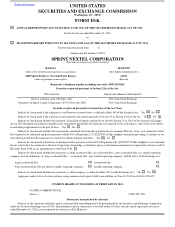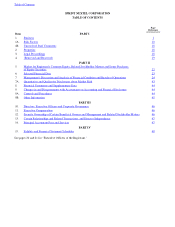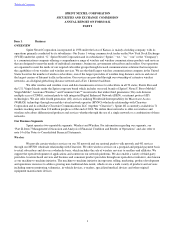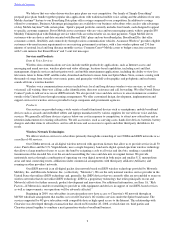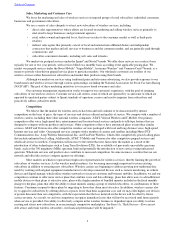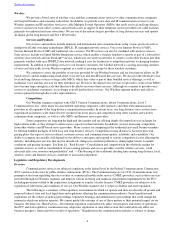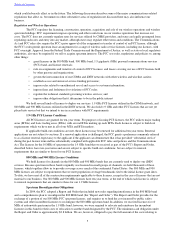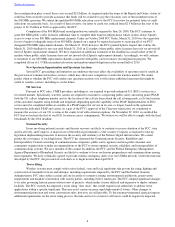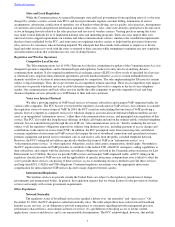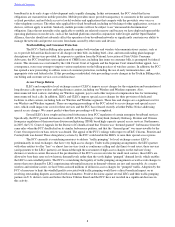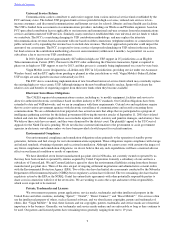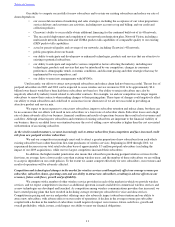Sprint - Nextel 2010 Annual Report Download - page 7
Download and view the complete annual report
Please find page 7 of the 2010 Sprint - Nextel annual report below. You can navigate through the pages in the report by either clicking on the pages listed below, or by using the keyword search tool below to find specific information within the annual report.
which could adversely affect us in the future. The following discussion describes some of the major communications-related
regulations that affect us, but numerous other substantive areas of regulation not discussed here may also influence our
business.
Regulation and Wireless Operations
The FCC regulates the licensing, construction, operation, acquisition and sale of our wireless operations and wireless
spectrum holdings. FCC requirements impose operating and other restrictions on our wireless operations that increase our
costs. The FCC does not currently regulate rates for services offered by CMRS providers, and states are legally preempted from
regulating such rates and entry into any market, although states may regulate other terms and conditions. The Communications
Act and FCC rules also require the FCC's prior approval of the assignment or transfer of control of an FCC license, although
the FCC's rules permit spectrum lease arrangements for a range of wireless radio service licenses, including our licenses, with
FCC oversight. Approval from the Federal Trade Commission and the Department of Justice, as well as state or local regulatory
authorities, also may be required if we sell or acquire spectrum interests. The FCC sets rules, regulations and policies to, among
other things:
• grant licenses in the 800 MHz band, 900 MHz band, 1.9 gigahertz (GHz) personal communications services
(PCS) band, and license renewals;
• rule on assignments and transfers of control of FCC licenses, and leases covering our use of FCC licenses held
by other persons and organizations;
• govern the interconnection of our CDMA and iDEN networks with other wireless and wireline carriers;
• establish access and universal service funding provisions;
• impose rules related to unauthorized use of and access to customer information;
• impose fines and forfeitures for violations of FCC rules;
• regulate the technical standards governing wireless services; and
• impose other obligations that it determines to be in the public interest
We hold several kinds of licenses to deploy our services: 1.9 GHz PCS licenses utilized in the CDMA network, and
800 MHz and 900 MHz licenses utilized in the iDEN network. We also hold 1.9 GHz and other FCC licenses that are not yet
placed into service but that we intend to use in accordance with FCC requirements.
1.9 GHz PCS License Conditions
All PCS licenses are granted for ten-year terms. For purposes of issuing PCS licenses, the FCC utilizes major trading
areas (MTAs) and basic trading areas (BTAs) with several BTAs making up each MTA. Each license is subject to build-out
requirements which we have met in all of our MTA and BTA markets.
If applicable build-out conditions are met, these licenses may be renewed for additional ten-year terms. Renewal
applications are not subject to auctions. If a renewal application is challenged, the FCC grants a preference commonly referred
to as a license renewal expectancy to the applicant if the applicant can demonstrate that it has provided “substantial service”
during the past license term and has substantially complied with applicable FCC rules and policies and the Communications
Act. The licenses for the 10 MHz of spectrum in the 1.9 GHz band that we received as part of the FCC's Report and Order,
described below, have ten-year terms and are not subject to specific build-out conditions, but are subject to renewal
requirements that are similar to those for our PCS licenses.
800 MHz and 900 MHz License Conditions
We hold licenses for channels in the 800 MHz and 900 MHz bands that are currently used to deploy our iDEN
services. Because spectrum in these bands originally was licensed in small groups of channels, we hold thousands of these
licenses, which together allow us to provide coverage across much of the continental United States. Our 800 MHz and 900
MHz licenses are subject to requirements that we meet population coverage benchmarks tied to the initial license grant dates.
To date, we have met all of the construction requirements applicable to these licenses, except in the case of licenses that are not
material to our business. Our 800 MHz and 900 MHz licenses have ten-year terms, at the end of which each license is subject
to renewal requirements that are similar to those for our 1.9 GHz licenses.
Spectrum Reconfiguration Obligations
In 2004, the FCC adopted a Report and Order that included new rules regarding interference in the 800 MHz band
and a comprehensive plan to reconfigure the 800 MHz band (the “Report and Order”). The Report and Order provides for the
exchange of a portion of our 800 MHz FCC spectrum licenses, and requires us to fund the cost incurred by public safety
systems and other incumbent licensees to reconfigure the 800 MHz spectrum band. In addition, we received licenses for 10
MHz of nationwide spectrum in the 1.9 GHz band; however, we were required to relocate and reimburse the incumbent
licensees in this band for their costs of relocation to another band designated by the FCC. The minimum cash obligation under
the Report and Order is approximately $2.8 billion. We are, however, obligated to pay the full amount of the costs relating to
Table of Contents
5

